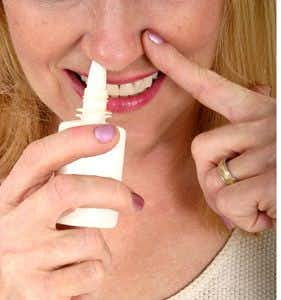
When you start taking a new prescription, you should always ask the prescriber for detailed information on when and how you should stop taking it. This consideration can be just as important for OTC medicines, but it is almost never provided. We have heard from scores of people who have had trouble with nose spray addiction.
Is Nose Spray Addiction Real?
Q. I have read on your website about people who became nose drop junkies. I too had this problem.
Years ago, on assignment in Australia I was scuba diving. When I caught a cold, I used Afrin to keep diving, and a year and a half later I was still using this nasal spray.
Not being able to breathe is horrible. I kept thinking I’d deal with it tomorrow; today I want to breathe.
I later did a story on cocaine treatment, and the director of the clinic told me about nose spray addiction. When nasal decongestants are used, the small blood vessels in the nose constrict. As the effect wears off, the nasal tissues become even more congested than before.
The cure was simple: I took an oral decongestant for two weeks. During that time breathing wasn’t perfect, but it finally returned to normal. I will never use nose spray again, now that I know it can be so addictive.
How Can You Overcome Nose Spray Addiction?
A. People don’t get high from nose drops, but many have difficulty kicking the habit. Rebound congestion is uncomfortable and can occur after three days of use.
You are spot on with regard to the mechanism. The vasoconstriction effect of the decongestant spray allows you to breathe beautifully for several hours. But if you keep using the products day after day, the body adapts. When you stop suddenly the prolonged rebound congestion may be even worse than the original stuffiness.
Oral decongestants may help relieve symptoms, but some people need stronger medicine. Prescription steroids (pills or sprays) can relieve stuffiness while a person is gradually weaned off OTC nasal decongestants.
Diluting Your Nose Spray:
Some people have come up with elaborate dilution strategies whereby they gradually reduce the strength of the nasal spray decongestant with a saline solution and wean themselves first in one nostril and then eventually in the other.
Using a Steroid Spray to Beat Nose Spray Addiction:
Q. I have a suggestion for the person who wrote about being addicted to nasal spray. I was hooked on Neo-Synephrine for more than 30 years.
Then I read that a prescription for Flonase could help. I was very skeptical but my doctor had no problem writing me a prescription.
I put one spray in each nostril and by that evening I had not used the Neo-Synephrine and threw the bottle away. That was in 1999. I had tried every method I heard about and nothing worked until I used Flonase, which I still use occasionally. I have shared my experience with other folks who are hooked on nasal sprays.
A. Fluticasone (Flonase) is a corticosteroid nose spray that helps reduce inflammation. It was prescribed to treat seasonal allergies such as hay fever and now is available without a prescription. It can also ease the rebound congestion that causes such misery when a decongestant nasal spray is halted suddenly.
Of course, nothing is perfect. We have heard from readers who have had difficulties with fluticasone.
Pat reported:
“I found that using it nightly over time to relieve nasal congestion caused me to have nose bleeds! It was destroying the nasal membranes. I now use Neo-synephrine 3x a week with no negative results.”
TM had a more serious reaction:
“I used Flonase for years. I developed cataracts on both eyes and had to have the cataracts removed when I was in my 50s. They don’t tell you that Flonase and other steroid nose sprays can contribute to the early development of cataracts but I found that out after it was too late. Also, for me, Flonase stopped working after awhile so it was back to the addictive nose sprays.
“I have tried everything and while some remedies work for some periods of time nothing has worked consistently over the years better than the addictive nose sprays. My congestion is always at night so it’s either use the sprays or I can’t sleep. I have tried decongestants and they clear up my nasal passages but the ingredients keep me awake. Some have suggested Bendadryl but this doesn’t decongest me.
“I wish there was a remedy that would help with my severe night time nasal congestion while letting me sleep through the night!”
Other Medicines That Can Be Hard to Stop:
The body is amazing in its ability to adapt to pharmaceuticals. Sometimes quitting a medicine can a lot harder than people think, and we’re not just talking about drugs of abuse. Even stopping acid-suppressing drugs used for easing symptoms of heartburn can be challenging. To read more about quitting proton pump inhibitors like Aciphex, Nexium, Prevacid, Prilosec and Protonix visit this link.

